Talking 'Just Like That...' with Bonnie Raitt
Celebrating the slide guitar legend's birthday with an extended version of our conversation from the Summer 2022 print issue of 'No Depression'.
Bonnie Raitt is having a moment…again. It’s been happening since I spoke with her about her most recent album, Just Like That…, the title song of which won the Grammy for Song of the Year at the 65th annual ceremony in 2023 (where she also picked up Best American Roots song for “Just Like That” and best Americana Performance for “Made Up Mind”). She beat out songs by Beyoncé, Taylor Swift, Lizzo, Adele, and Harry Styles.
She will also receive one of this country’s highest honors for the arts this December during the Kennedy Center Honors, along with Francis Ford Coppola, Arturo Sandoval, and the Grateful Dead. Also, younger artists from Bon Iver to Charlie XCX and Maggie Rogers are sampling and covering her songs, introducing a new generation to one of the most consistently solid blues, rock, and folk stylists of the last 50 years.
I first talked to Bonnie in 2020 for my book, Have A Little Faith: The John Hiatt Story. She’s long been a champion of Hiatt’s songwriting. After all, her album, Nick of Time, was boosted by the Hiatt-penned single, “Thing Called Love,” and it led to her winning four Grammys at the 1990 ceremony the following year, including Album of the Year. It set off a whirlwind of activity for an artist whose due had been long overdue.
Now, 35 years later, it’s déjà vu all over again. While I’d like to think I helped set this whole “Raittaissance” (as Rolling Stone writer David Browne dubbed it) in motion with this interview she granted for the Summer 2022 print issue of No Depression (we were one of the first media outlets she spoke with during the press cycle), the real reason is simply because she’s Bonnie-damn-Raitt. Her latest album is worth all the raves its received over the last couple of years.
As is often the case, all the best parts of an interview won’t make it into the finished piece. So, below you’ll find the outtakes and asides that I wish had made the final cut. We talked in depth about her parents, her influences, and how her faith shapes both her outlook and devotion to activism. It’s presented here in a traditional Q&A format, pretty much how the conversation occurred, unlike the more narrative approach of what was published. This piece pairs well with what made it into the Summer 2022 edition, which also includes my conversations with Sue Foley, Susan Tedeschi, Robert Cray, Jimmie Vaughan, Kim Wilson, and NRBQ’s Terry Adams, as they all shared testimonials and anecdotes about Bonnie.
You can order your own copy of that issue by clicking here. (You can also subscribe to No Depression to receive their quarterly journal all year long by following this link.)
Interestingly, although John Hiatt grew up Catholic, his ancestors were Quakers. Bonnie Raitt’s parents were Protestants who converted to Quakerism. I began by asking her about her experience growing up Quaker…
When I was writing Have a Little Faith, it was fascinating to learn that Hiatt came from Quakers, as do you.
I had forgotten that he was a Quaker, and that was so great to open the book and say, ‘Oh, my God, no wonder I love that guy so much!’
So, I wanted to ask you: What, in your upbringing as a Quaker, helped inform your belief system? And is it still a part of you today?
Oh, I'm very proud of my Quaker background. Both my folks were raised in different traditions. My mom was the daughter of a Methodist minister and my dad was the son of a Scotch Presbyterian, both of whom had pretty strict ideas - especially the Scotch Presbyterian - about dancing and frolicking on Sunday. And I had to go to church a lot. I mean, I love my grandparents, but by the time we came along, we were drawn to Quakerism because of the pacifism and seeing ‘that of God in every person’, [meaning] it's up to us to resolve conflicts by making sure you see God in the other person, which is why killing is wrong. And also, just the idea of social justice and getting along with, appreciating, and respecting each other. When you look at the teachings of Jesus or Buddha or Muhammad, but especially in a Christian tradition that we were raised in, those are the teachings of turning the other cheek. Those are the principles that inspired Gandhi and Martin Luther King, Jr., and they inspired my folks as well.
There is no loving thy fellow man or woman without also working to ease suffering and injustice and being of service where you can. Take what you need and share what you have. Start every day by seeing if you can be a blessing to somebody and rectify the things that are wrong. Look around and see if someone is starving or suffering from injustice. Work and do what you can to rectify it. Those are the principles I was raised in.
Growing up Quaker naturally led you to Quaker summer camp. Was that your first experience with folk music?
There was a big folk revival in the late 50s and early 60s when I was a kid and the Quaker summer camp counselors were playing folk music around the campfire. So, I joined the folk music club. Joan Baez was my hero, and so by osmosis, I got into Odetta, Pete Seeger, Woody Guthrie, Peter Paul and Mary, and Bob Dylan…but Joan Baez was the queen. She was Quaker as well as Scottish Mexican. She had it all going on!
I taught myself to play guitar when I was nine. I begged and got one for Christmas, and started basically fingerpicking folk songs. And then someone gave me, on the same label as Joan Baez [Vanguard], Blues at Newport ‘63 which had Brownie McGee, Sonny Terry, Mississippi John Hurt, Reverend Gary Davis, John Lee Hooker, and two white guys, Dave Van Ronk and John Hammond, Jr. I fell in love with Mississippi John Hurt and Brownie McGee's guitar playing. I taught myself the songs that were on that album. I remember it like it was yesterday. I had never taken a guitar lesson, but I figured out how to do most of the songs so that I could sing and play them for myself.
I fell in love with country blues when I was 14. Before that, the Rolling Stones turned all of us onto Muddy Waters, Slim Harpo, and Howlin Wolf, you know, so many great blues artists that we would never have been exposed to. I always loved Fats Domino, Chuck Berry, Little Richard, and Lee Dorsey. Then all the Motown acts, so I was way into soul music when I was still a kid, even before I was into folk music. They all came together in my room with my guitar. I'd sit there and play Lenny Welch's “Since I Fell For You,” which I danced to at the sixth-grade dance. Any song that occurred to me, I would learn it on the guitar. I just really wanted to entertain myself.
As I got older -15, 16 years old - my older brother bought Paul Butterfield and Mose Allison records and, later, Jimi Hendrix when Are You Experienced? came out. So, I just love so many different kinds of music. And my folks were so eclectic with what they played for us at home: Mahalia Jackson, Frank Sinatra, and Ella Fitzgerald. I think that's where I got my love of interpreting other people's songs. Not that I don't really care about writing my own material, but I'd be bored with my own point of view for 12 songs. I love putting together a really interesting album and show based on the classic records I heard growing up of people interpreting great songs by other people.
You’ve mentioned in years past that John Hammond and his slide was an influence on your playing, but your grandfather also played hymns on a Hawaiian Lap Steel. Did watching him play influence you as well?
Well, just once when I was six years old, I went over to his house and he had a bunch of different instruments, like autoharps, and he had this Hawaiian Lap Steel because it was a sound that was in a lot of popular records at that time. It was a big fad after the war. So he taught me to play “Jesus Loves Me,” and I remember thinking how cool it was that you didn't have to finger the chord, you could just move this bar up and down the neck and sing any song you wanted. When I finally heard slide guitar, I think on [the Rolling Stones’ version of] "Little Red Rooster,” I recognized it. And then, of course, [I heard] John Hammond, and when Robert Johnson's record came out, that was it. Later, as I became a complete blues hound, I would just soak up whatever blues record I could get.
You had the opportunity, through Dick Waterman, to be close to some of the greatest blues legends of the last century. What did you learn from them that you still carry with you?
I became close to Mississippi Fred [McDowell] and we just hit it off. He would come up from Como, Mississippi, and stay at Dick [Waterman]'s place. Dick had by then moved to Philadelphia, and I would come there on the weekends. I just loved the way he played, but I also loved him as a person. And later when I became close with Sippie Wallace, it was the same thing. She told me all about the tent shows that she was part of and what it was like to be a woman surrounded by all these guys all the time on the road and in the orchestras. She gave me lots of advice, as did Fred, about how to stay in a relationship and what you don't want to put up with; make sure you don't do this and don't do that. I learned a lot of life lessons, just like if you were tight with your grandparents. Fred was in his 60s when I was in my 20s.
Later, I became close with Muddy Waters, BB King, Ruth Brown, and Charles Brown. What I took from my incredible blessing of the proximity to these legendary people, was not only the understanding and history of Black music and blues and rhythm and blues in this country but the cultural climate of what it was like to just live and breathe in America during those eras. Not just in the music business, but just to grow up in the South. It couldn't have been more different from my life growing up in Los Angeles. I didn't kill chickens and cook them for dinner. So, I learned a lot.
Fred also taught me a couple of chords I wasn't able to pick up on my own. Others I just picked up by ear. I listened to how he played and I tried to emulate everything that they did vocally and how they approached the blues. I knew every minute how lucky I was to have the proximity that I had. And this is coming from somebody who got to hang out backstage with one of the greatest Broadway-leading men of all time. I mean, I was lucky enough to grow up as John Raitt's daughter, let alone hang out with John Lee Hooker.
One of my favorite things that ever happened in my life was when I got to play Radio City Music Hall and I invited my dad and John Lee Hooker to be my special guests. This was like, maybe 1995 or something. I'd already won Grammys and had some commercial success so I could afford to bring special guests out on the road. I looked over and John Lee and my dad were both so nattily dressed and they had their legs crossed exactly the same way, in these beautiful clothes, sitting in chairs right next to each other, visiting while I was singing. And it occurred to me, who else in the history of music would be able to have John Raitt and John Lee Hooker on successive guest spots in their show, and how lucky was I to have that work? And they were really good friends! I mean, it was fantastic. They talked about arthritis, I'm sure Viagra, and all kinds of stuff. [laughs]
I remember Keith Richards snickering that folks have been saying the Rolling Stones have been too old to play since 1973, but, as he pointed out, you never hear anyone say that about John Lee Hooker or BB King.
Absolutely! Keith had a great point, and they’re even more ruthless toward women. One of the good things about being more like a character actress than a leading lady is that I don't have to take the slings and arrows of people making it about, in this culture, the extreme focus on looks and youth, at least in the blues wing of Americana, and maybe jazz and even opera, although that's changing. I mean, it used to be opera singers were kind of corpulent and big. Now, look at the ads for classical violinists and pianists and opera singers, they're all total babes! But, it's nice to be able to get older and not have the focus be on your looks. I don't look at social media comments, but by staying parallel to the mainstream music field, it's been really great, because as long as I'm still making music that's interesting, and stretching not coasting, I think my fans are going to come see me for as long as I want to play for them. That's my aim. I don't write enough music or sell enough records to retire. I have, like, 30 people to support so I need to be out there. I asked BB why he stayed on the road so long. He pointed to his band and said, “Those guys need to work."
As far as your band goes, you have some incredible players on the road and on this album. It just sounds like you guys are locked in and having a great time. I can tell what the live show is gonna sound like by listening to the album, which is always a strong testament.
I have been so blessed to have some of the greatest musicians. Ricky Fataar and Hutch Hutchinson are a world-class rhythm section. George Marinelli makes great solo records as well. We have Duke Levine coming out on the road this time and George, Duke, and I are going to be a triple threat on guitars for some of the shows in the big cities. And now we have Glenn Patscha from a great band, Ollabelle. He was hand-picked out of Rosanne Cash’s band on the Johnny Cash tribute tour by Ry Cooder to play with him, so you know Glenn is not only an unbelievable singer, but I think that organ solo on “Blame it on Me” is one of the most astonishing keyboard performances I've heard. You know, [her longtime keyboardist] Mike Finnegan is a hard act to follow. But sadly we lost him [in 2021].
You wrote four songs on this album, and one of them, speaking of great organ work, “Waitin' for You to Blow,” is fantastically funky.
Oh, thank you. I'm so proud of that. I wrote all the little pieces; all the little breaks and little licks and stuff. Then Glenn added some little wiggly organ stuff that's kind of spacey. The guys ran with what I wanted to do. And I'm so happy with the way it turned out.
And that little time change in there where it moved to the shuffle --
Oh, when I was explaining to the guys what the song was, I said, ‘And then this part goes to a shuffle,’ they went, ‘I don't think so.' And I said, ‘Yep!’ [laughs] You know, it's hard to be a woman bandleader when you're not the best musician in the room, but you have some strong ideas. I said, ‘You know, I wanted to stretch on this record, so here's me stretching.’
From someone 12 years sober, those lyrics really hit home.
Oh, I'm so glad. Well, as somebody who's 34 years in recovery, you don't have to be sober from addiction to know that those little devils are on your shoulder at any moment waiting for you to mess up.
It's so funny because I've had it in mind to write something like that. And I really wanted to put those kinds of words on top of a funk tune, like kind of a jazzy funk thing. It's the most adventurous song I've ever written. The line that kind of wrote itself is at the very end: "I let her love draw close enough to see she really cares / But no way do they get inside in case there’s no one there.” That's the ultimate confession. That’s what we're all scared of, letting somebody in. Because there must be some reason why, if you keep picking people that are going to push you away or leave, you can blame them instead of realizing that you push people away because you don't want to let them get too close. Parts of us are like that, even if we're in good relationships. There's a limit; you have to watch it. They're waiting for you to blow.
Of course, there’s also the title track, “Just Like That.” Four songs into the album, I’m suddenly an emotional mess, just boohooing all over the place. It’s beautiful.
Oh, Michael, I’m sorry! But thank you. I don't know how I'm gonna play it live but we just rehearsed for a little bit and I got through it. I love playing it and I'm so glad that you like it and it's very emotional for sure.
I mean, the lyrics speak for themselves, but musically, it's got that strong folk influence from years past, maybe back at that summer campfire circle.
And those early Bob Dylan records. There’s nothing like Bob Dylan’s story songs - “Only a Pawn in Their Game," “Lonesome Death of Hattie Carroll” - I mean, song after song. But John Prine, Jackson Browne, and Paul Brady's early records, when they’d finger pick, are also my inspirations. Especially “Down the Hall” because the open tuning is so Celtic. You know, I listened to Paul Brady all the time. He's one of my favorite artists. Bob Dylan loved him too. “Masters of War” was inspired by Paul Brady.
Yea, your finger-picking on “Down the Hall” is just wonderful.
That's what those campfire counselors showed me. I fell in love with folk music at the same time as almost all of America did in 1960. I mean, we just couldn't get enough. I think everybody got a guitar for Christmas.
Your parents, John and Marjorie (“Marge”), were special people, each in their own way. You lost them both within seven months of each other, with which I can definitely empathize. With the time you had with them, what life lessons did you learn from them?
Well, let me say, it is great to be asked this. My dad was one of the most optimistic and glass-half-full people I’ll ever be blessed to know in this life. After he passed, even at his memorial, none of us could think of one negative thing he ever said about anybody. That's really an accomplishment. He stayed busy doing stuff that he really wanted to do every day. He had a purpose or he had a project. He cared about his voice and cared about his physical health. I think having been raised an athlete, and then to make his living doing something that he was just doing anyway for fun, was never lost on him. I learned that from him.
He was so happy when I got sober and was taking better care of myself. I've said this many times, but in your 30s, it catches up with you. So my folks were really happy when I cleaned up my act and seemed to be more happy and balanced.
So, from my dad, I got my work ethic and my play ethic. My mom was an incredibly committed political activist, spiritual seeker, a fantastic interior decorator, a garden landscape designer, a magnificent pianist, and singer. So, I got as much of my good eye, good ear, and good sense of artistry from her as my dad. She just really was an incredibly alive and curious person. I admired her.
As a musician, I wish that she had gotten more credit. As the years went on, I would talk about her, but they always just printed the story about my dad and me, my dad and me, my dad and me. So I wrote ‘The Ones We Couldn’t Be’ to close my last record (Dig In Deep). It was partly for my relationship, but also for my mom. She probably was really proud of me, but I know she wished she could’ve had a shot. She gave up her career to raise us and be my dad's musical director. But then they split up and he married someone else, and she went on to get married again herself. [Her parents divorced in 1970 and Marge married Dr. James Goddard six years later.] She never got the credit she deserved. I sing ‘Angel from Montgomery’ for her a lot of the time because I just feel she’s like all those women who never got a shot at getting what they reached for, or what they could’ve been in the world. They compromised and couldn’t. She could’ve had a great career, but she couldn’t fit it all in.
So now, our job is to live for the ones that didn’t make it. That’s what we’re doing.
Oh, yeah.
We really do need to pay tribute to the women who sacrifice, sometimes everything, to make us who we all are. We owe them all so much, and we could probably never properly repay that debt.
Exactly! My mom sacrificed a tremendous amount. She was my dad’s manager and picked his material and his clothes and rehearsed his songs and helped fashion his nightclub act and...you know...She was as important a partner and got no credit for it. The men in the business poo-pooed her the whole time and thought she was just being too ballsy and overstepping, and it just pissed me off. Which is why I'm so strong-minded about my business, because my dad was very laissez-faire, while my mom got the shaft.
That’s why I have grabbed at my career and I run my show, because of what I learned from my folks. I'm not going to wait around for someone to give me a gig. I'm not going to believe them when they tell me 'this is the right deal.' I'm going to have complete artistic control. I'm going to give and receive credit where it’s due and captain my own ship.
Looking at my folks’ lives, both the successes and what they could have done differently, really informed my path. [My passion for] activism came from both of them, not just my mom, but she was avidly active in all kinds of organizations and I'm really proud to be her daughter.
Since your days as a college student, that passion for activism has been a large part of what drives you. That philosophy is needed now more than ever.
The threat to democracy, the existence on our planet, social justice issues, and just the rights of women and protection of voting - all of that has been threatened on a level that I just never would have thought 50 years on. Especially after the Civil Rights Movement, the peace movement, the ban-the-bomb movement, working for safe energy - just the dream that we were going to all try to get along better, resolve our conflicts, be civil to each other, trust science, and find what we have in common - that was something that I, along with my whole generation, thought we were moving towards. A more just, kind, and tolerant world that would respect the earth and our resources and make government and companies responsible for the betterment and protection of the people. More equal access to education, jobs, health care, and all the things we thought we were moving towards have all been torn asunder.
I'm spread thin, but mightily so. There's no turning back. You can't just put your head in the sand and say, ‘Oh, the better days are behind us, and it didn't work out. I'm disgusted with the corruption and waste of money.’ You know, you could go down that road, but that's not going to serve us. So I'm focusing on the ways that I can be of help.
Thanks, Bonnie. A pleasure as always. As a fellow Scorpio, I fully understand your drive.
Oh, God. The Scorpio is the only animal that accidentally stings itself with its own tail. It gets so worked up, that it stings its own head. That’s the truth! It’s a perfect metaphor.
Bonnie’s currently on tour. Find tickets and all the info here.
You can also check out a print excerpt from my most recent feature in the Summer 2024 print edition here: A Living Tribute: Fellow artists celebrate Drivin N Cryin's Kevn Kinney with 100-song tribute project.
Also, check out a wonderful Bonnie Raitt backstage memory from Brad Kyle here.


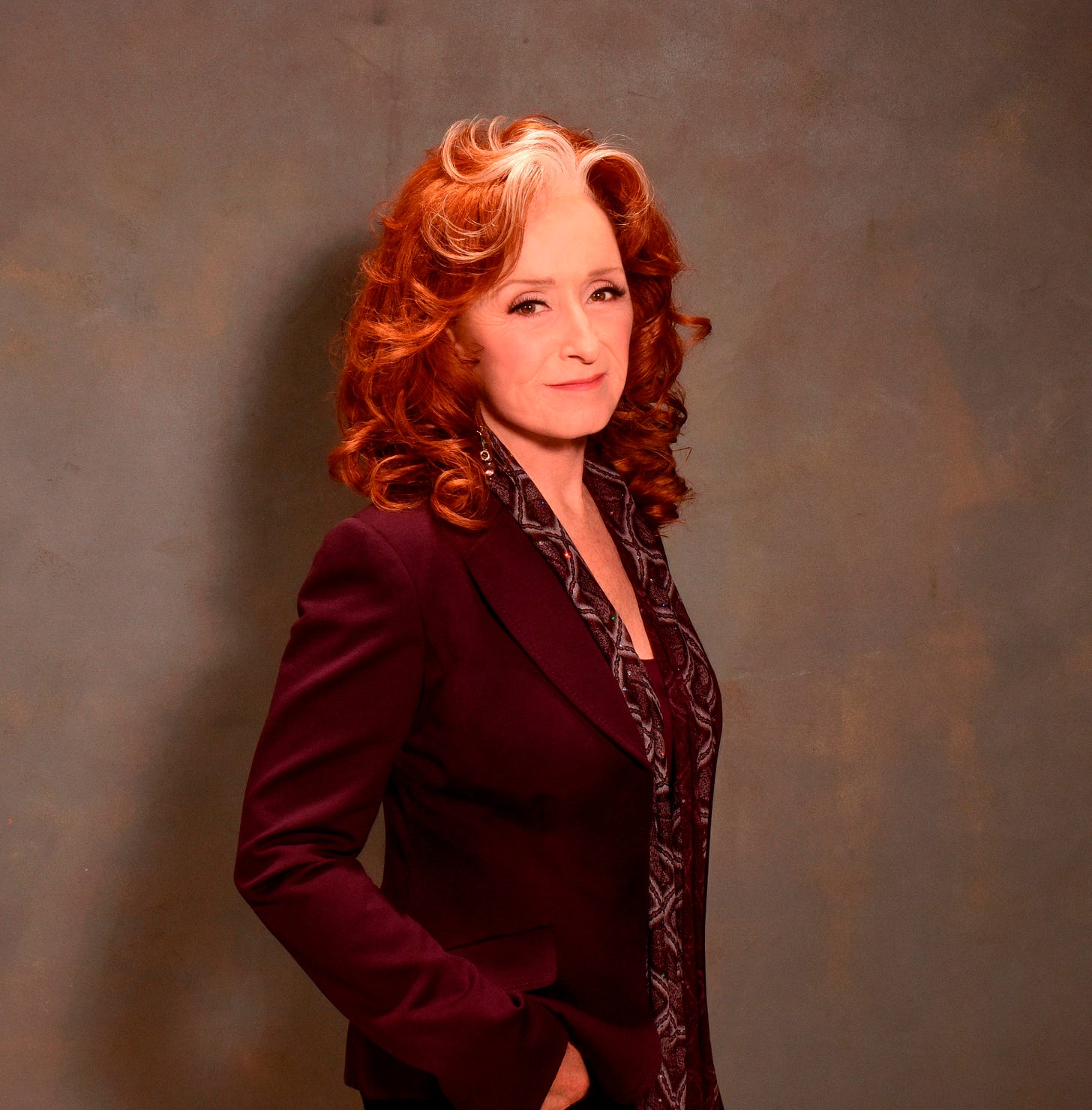
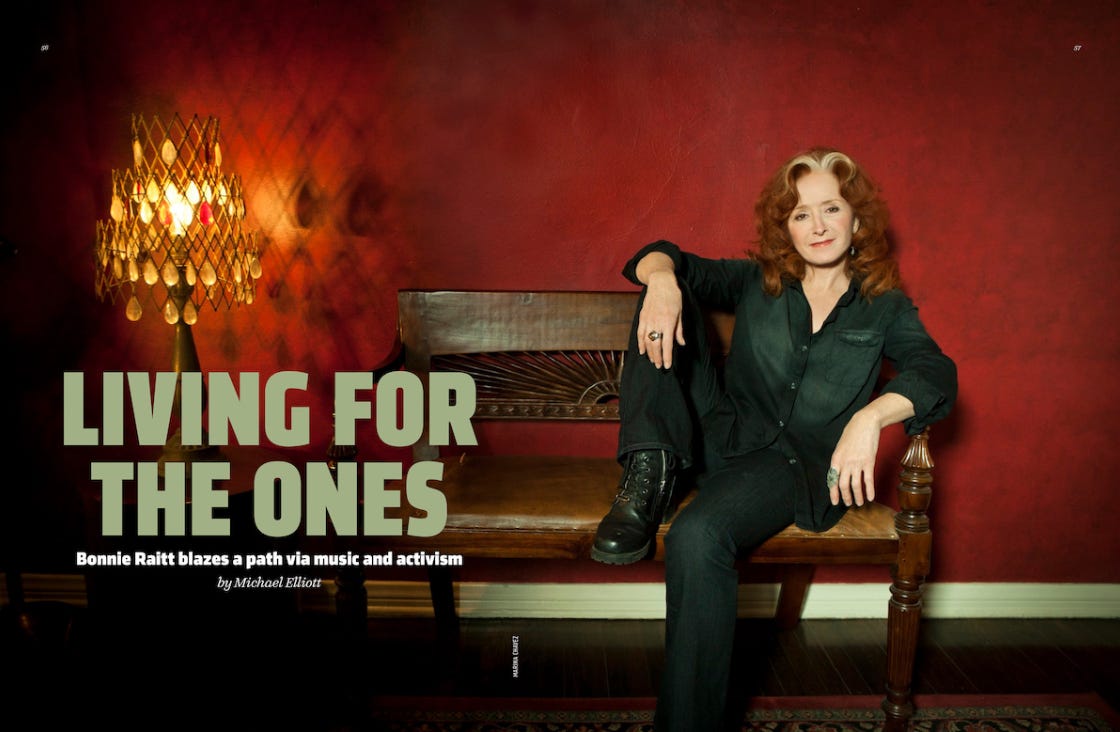
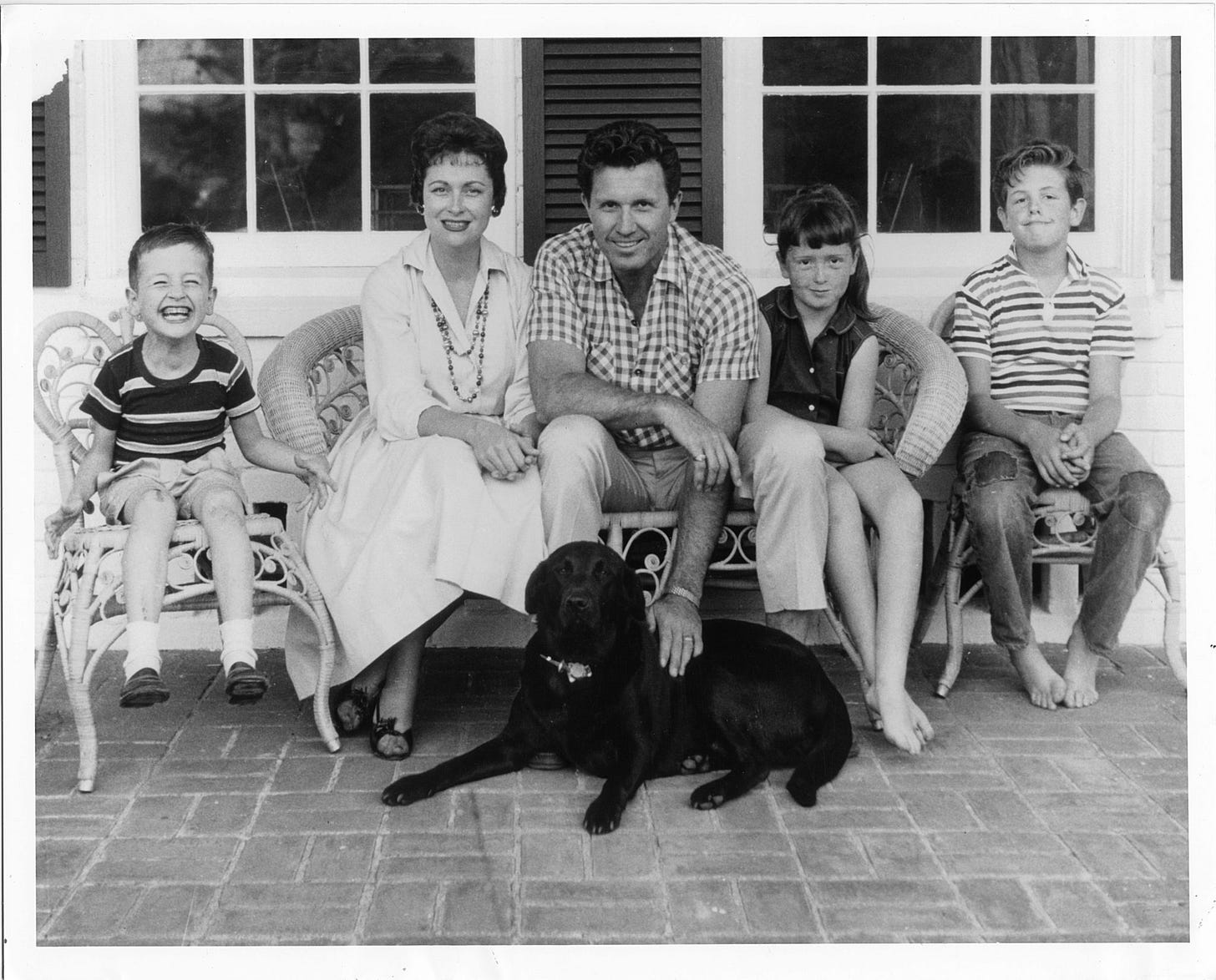
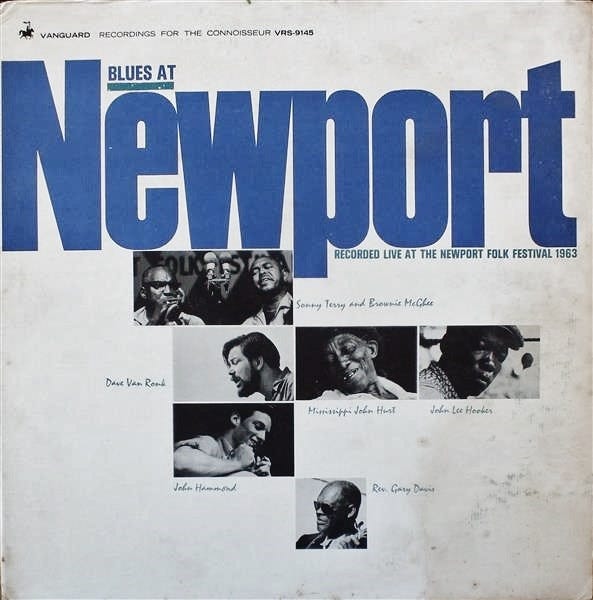
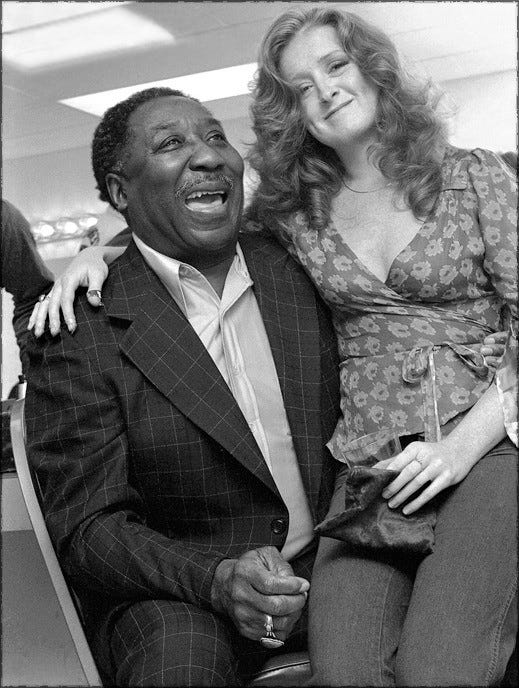
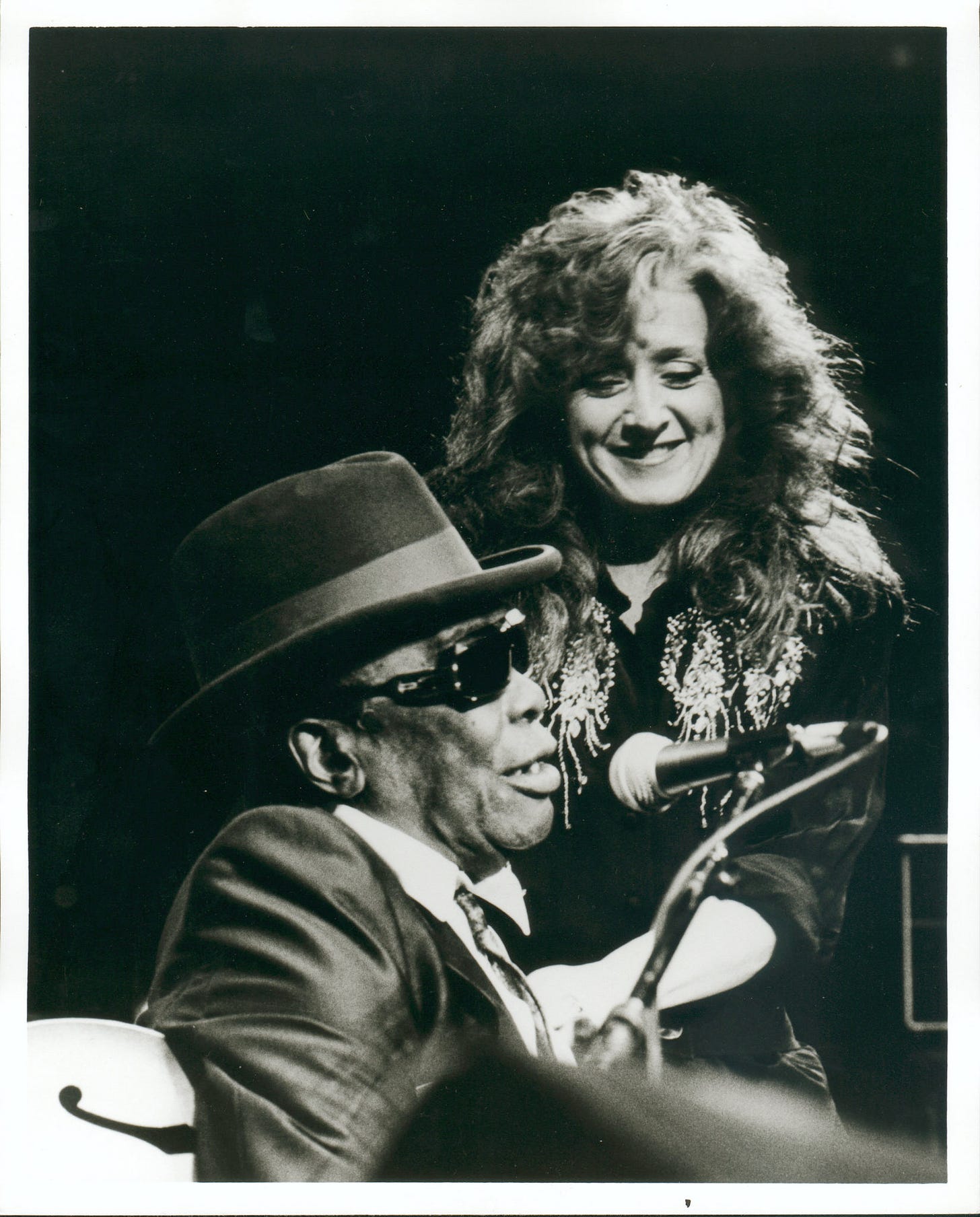
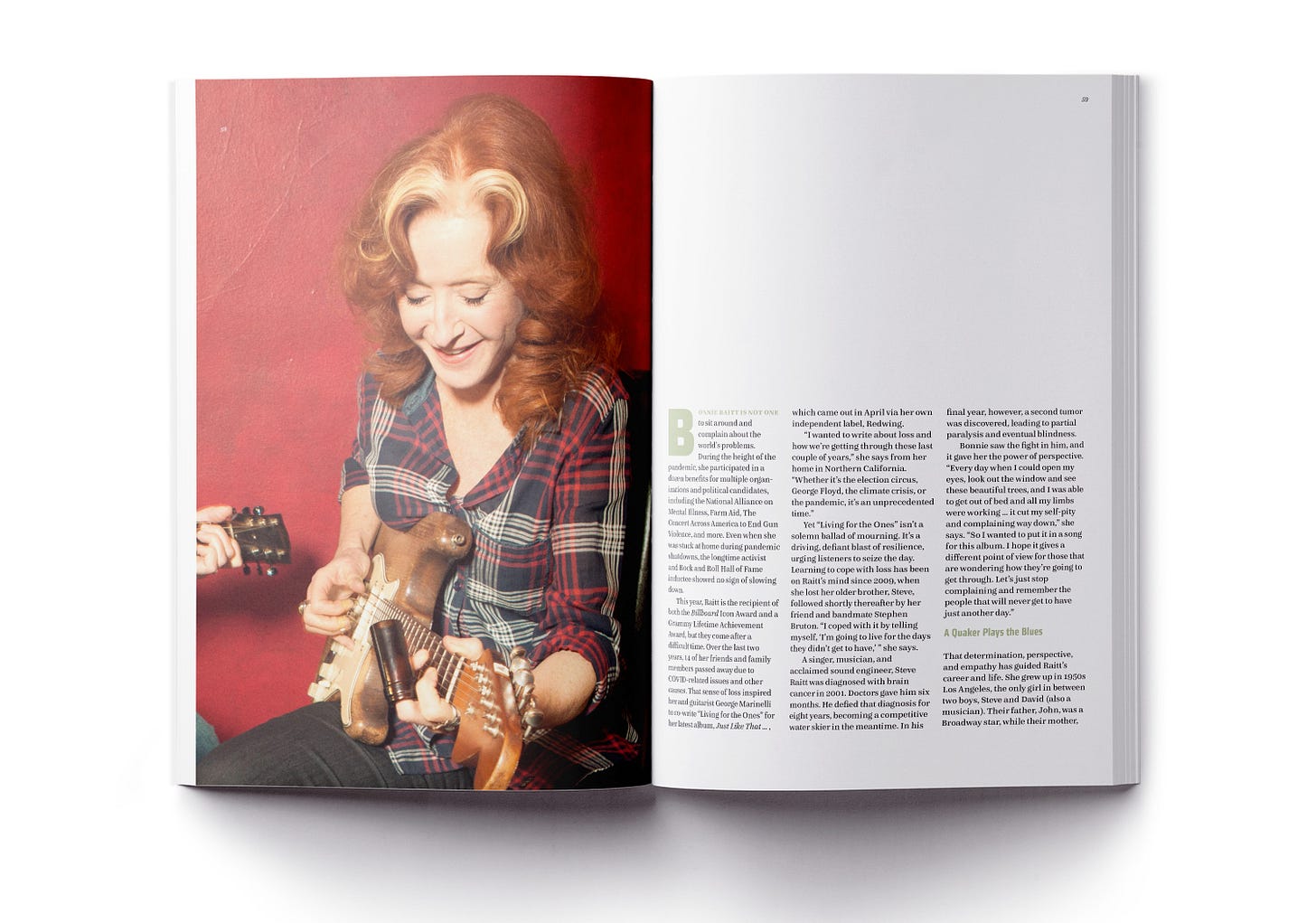
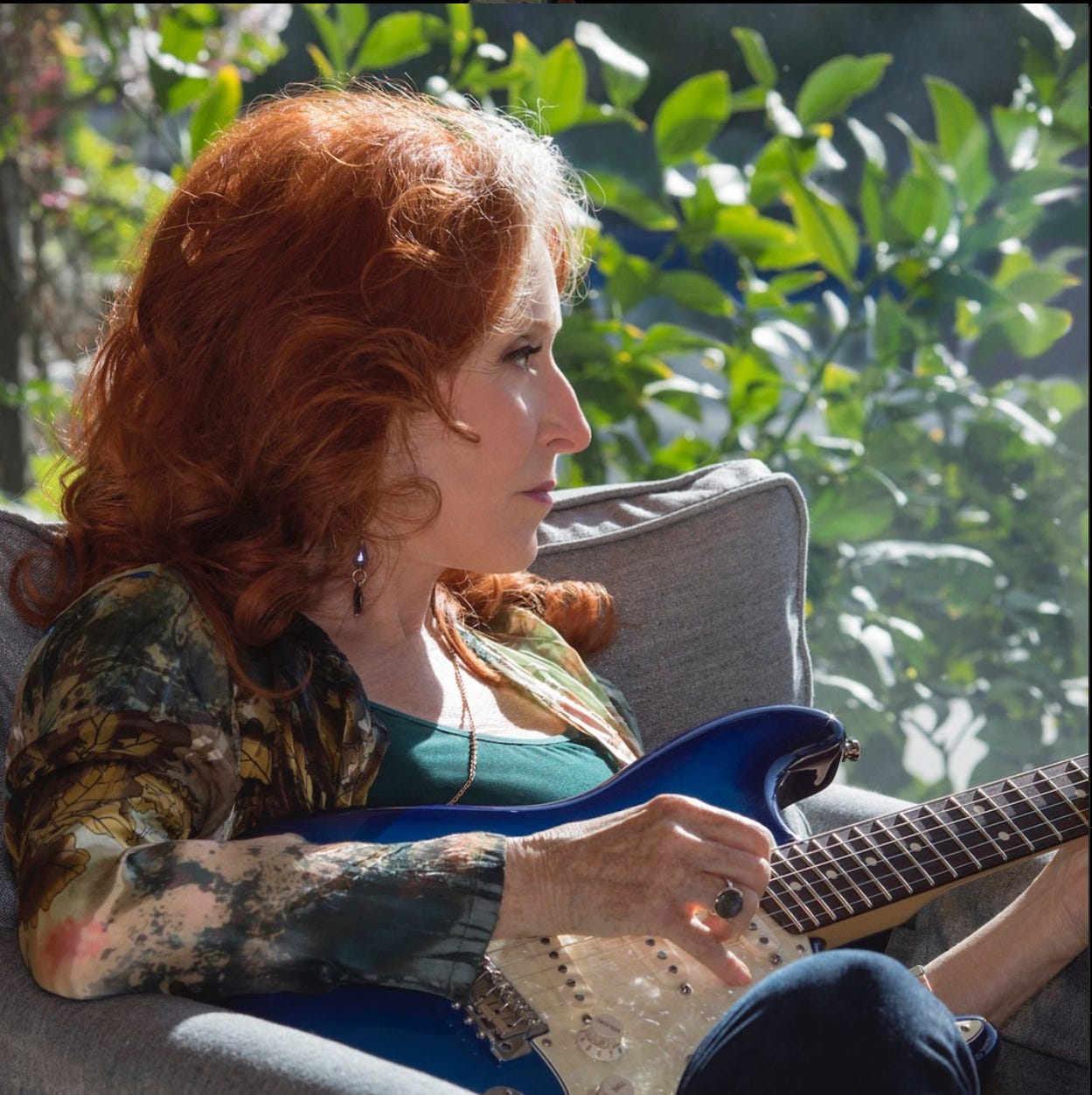
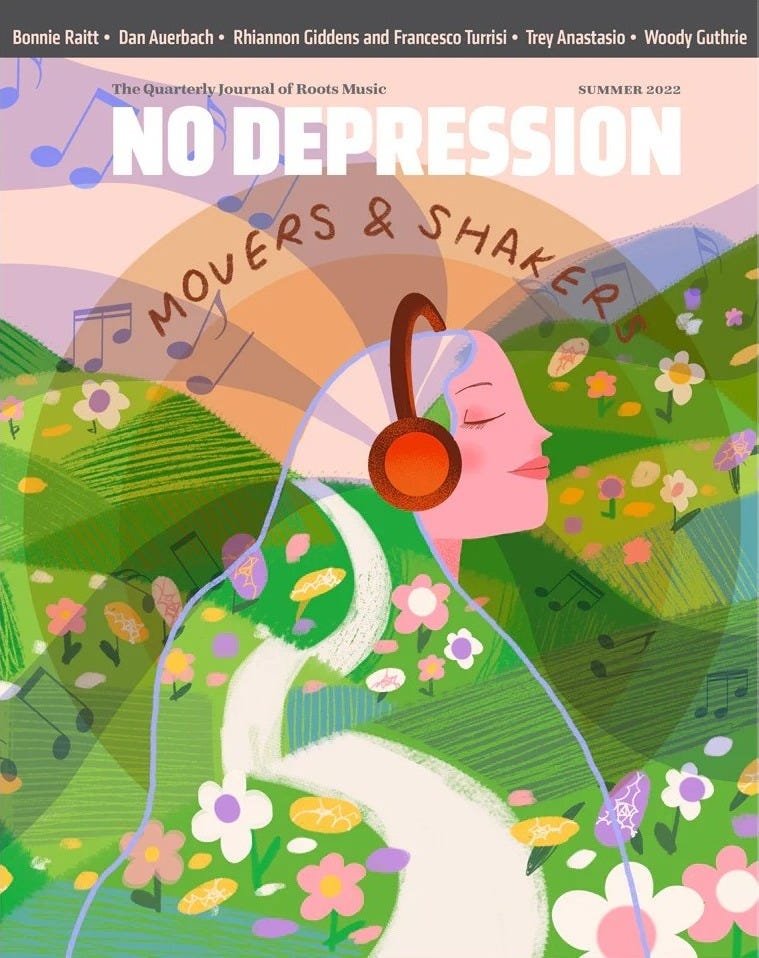

Great interview. Love to read pieces where you can "see" the conversation and connection taking place, and this interview is one of those. I especially appreciated the conversation about her parents, particularly her mom.
"Just Like That," the song and the album, deserved/deserves all the kudos it has received.
I was particularly happy to the mention of Charles Brown. Not sure if you've seen the piece I did on him a couple of years ago, but my one in-person encounter with Raitt is mentioned in it. https://open.substack.com/pub/glenncook/p/the-legacy-of-charles-brown?r=727x&utm_campaign=post&utm_medium=web
And finally, thanks for the push over to the ND site to read about the Kevn Kinney tribute. I've been talking about the first one since it came out, and am anxious to dig into more.
Thanks so much for your further in depth interview with Bonnie. Pleasurable and, as always, informative start to finish and from it, via Spotify, I am now listening to Glenn Pastcha's Songs from the Jefferson Highway, an eclectic and quite interesting work I would never have unearthed without this time spent with Bonnie. Just in case you are interested and haven't traveled there yet, https://open.spotify.com/album/5BHoUIZesYdge2mCNWq2fp?si=vN4zx5niRWGnd4BeIQh_rQ Thanks again!